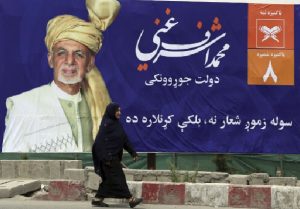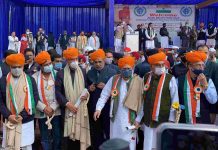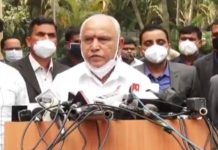 Afghanistan, which continues to remain in the news mostly for wrong reasons, faces a new kind of uncertainty. Nobody can say with certainty when exactly it will acquire the status of a peaceful law-abiding nation. The results of the just-concluded presidential elections, to be declared in the third week of this month, are unlikely to bring about peace and stability in the strife-torn country.
Afghanistan, which continues to remain in the news mostly for wrong reasons, faces a new kind of uncertainty. Nobody can say with certainty when exactly it will acquire the status of a peaceful law-abiding nation. The results of the just-concluded presidential elections, to be declared in the third week of this month, are unlikely to bring about peace and stability in the strife-torn country.
Both leading contestants for the post of President, incumbent head of government Prof Ashraf Ghani and Dr Abdullah Abdullah, are claiming victory, but there are also chances of the results showing a tie. In such a situation, a re-election will have to be held which may not be possible till the months of extreme winter are over. This means the caretaker government of Ashraf Ghani will not be able to take any major decision during this period which will only add to the chaos in that country. It’s a different matter that the government’s writ hardly runs beyond the country’s capital, Kabul.
In case there is a clear winner, the new government too will be there only in name. The de facto rulers of Afghanistan, the powerful Taliban factions, who boycotted the elections, have declared that for them the new government, like the previous ones, will be a US puppet government. This means the Taliban’s attacks on the government’s interests will continue unabated.
President Ghani has stated that if he came back to power again he would extend a fresh offer of talks to the Taliban with a view to associating the militant elements with the governance structure. The Taliban factions are, however, not interested in holding any kind of dialogue with the government, though it would be an elected one. They have, however, made it clear that they want the snapped peace dialogue with the US to be revived so that the foreign forces stationed in Afghanistan leave for home, allowing Afghanistan to be governed by Afghans without disguised or undisguised US support.
India’s investments in Afghanistan will be best protected if the elected government, whenever it is formed, remains in a commanding position even after the Taliban factions become a part of it. Asharaf Ghani and Dr Abdullah Abdullah realise the importance of India’s role in the task of rebuilding of Afghanistan.
The US, which has snapped the US-Taliban dialogue process, has been little bothered about India’s interests as it had agreed to keep New Delhi away from the negotiations between the two sides with Pakistan allowed to play the role of a major facilitator. Yet the dialogue was a welcome development as the establishment of peace in Afghanistan would have sent across South Asia and beyond an encouraging message.
The US decision to discontinue the peace talks with the Taliban was entirely not surprising. The Donald Trump administration wanted the Taliban to cease fire and stop their suicide bombings during the peace negotiations, but the Afghan militants ignored the US plea. The militants insisted that this could be done only after reaching an agreement. They gave an indication that violence was part of their bargaining tactics to force Washington to accept their demand that no foreign troop should remain on the Afghan soil once an accord was signed between the two sides.
The US, which was tolerating Taliban suicide bombings as the cost to pay for a larger goal, had declared that the promised troop withdrawal did not mean complete desertion in one go of the land they had captured in 2001 in the wake of the 9/11 terrorist attacks on the US mainland. The US wanted 8000 of its 14000 troops to stay put and its armed forces had to leave for home only after successful conclusion of the peace negotiations in the Qatari capital, Doha.
The Trump strategy included periodic troop withdrawal, which appeared to be unacceptable to the Taliban. But they had willy-nilly agreed to this condition along with giving an assurance to eschew violence and not to allow any foreign terrorist group like the Al-Qaida and the IS to use any part of Afghanistan for indulging in destructive activities after the signing of an agreement. The negotiations had almost concluded and an agreement likely to be finally signed at Camp David, Maryland (US), but President Trump appeared to be unsure of the calculated gains from the eight-month-long exercise when there was no end to the Taliban’s killing spree. Hence his decision to call of the talks.
There was undeniably a huge trust gap between the two sides. In view of this fact, it is believed that Trump was, perhaps, looking for an excuse to snap the negotiations and he got such an opportunity when an American soldier was killed along with 11 others in a suicide bomb attack on September 5.
Trump announced his decision through a series of tweets after the Taliban accepted responsibility for their involvement in the heinous act. In one of his tweets, he said, “If they cannot agree to a ceasefire during these very important peace talks, and would even kill 12 innocent people, then they probably don’t have the power to negotiate a meaningful agreement anyway.”
Whether Trump will review his decision in the interest of peace and stability in Afghanistan and the rest of the region remains to be seen. But history will remember him as a far-sighted head of government if he allows the peace dialogue to reach its logical conclusion.
Signing an accord despite the provocations to the contrary would be a better option than going back to where the situation was over eight months ago when the peace negotiations were initiated.
The militant group stated after the snapping of the dialogue, “The US credibility will be harmed; their anti-peace stance will become more visible to the world; their casualties and financial losses will increase, and the US role in international political interaction will be discredited even further.”
The Taliban, of course, are no great diplomats. They were believed to be knowing only the language of violence to achieve their objectives. But now they are providing proof that they are not bad negotiators. Perhaps, they now realise that diplomacy must be given a full chance to bring about peace in a country which has not seen it for decades.











